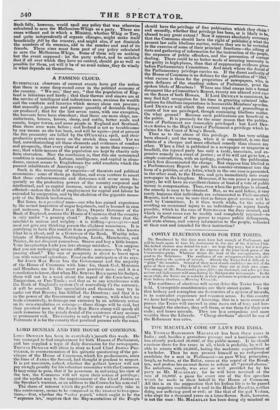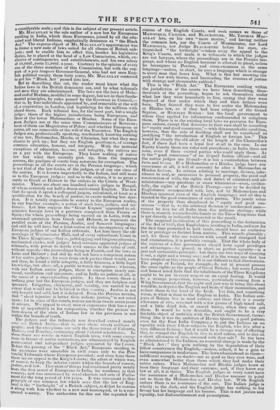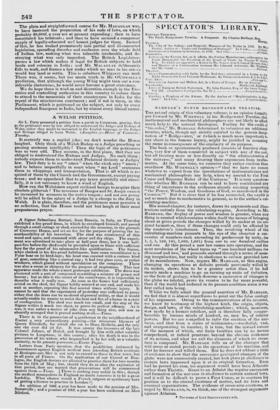THE MACAULAY CODE OF LAWS FOR INDIA.
MR. THOMAS BABINGTON MACAULAY has been three years in India and, besides a gratuitous passage and a handsome outfit, has already pocketed 30,000/. of the public money. If he should continue there for five years in all, which is probable, be will be able to return with 50,0001., bating the moderate expenditure of a bachelor. Then he may present himself as an independent candidate for a seat in Parliament—on pure Whig principles ; laugh, as before, at the Ballot, sneer at the repeal of the Bread- tax, and profess his earnest desire to reform all "proved absues." No subaltern, surely, was ever so well provided for by his party as Mr. MACAULAY; for he will have received at the rate of 10,000/. a piece for every one of the five speeches which he made in their behalf in the House of Commons. All this is on the supposition that his Indian life is to be passed in the negative condition of a soul in the Hindoo Paradise, neither doing nor suffering good or evil; or like that of the god Vishnu, who slept for a thousand years on a lotus-flower. Such, however, is not the case: Mr. MACAULAY has been doing sly mischief on
••••■
a considerable scale ; and this is the subject of our present article.
Mr. MACAULAY is the sole author of a new law for Europeans residing in India, which those Europeans, joined by all the edu- cated and liberal Indians, emphatically denounce as " the Black Act." The express object of Mr. MACAULAY'S appointment was to frame a new code of laws suited for all classes of British sub- jects; and to enable him to effect this, besides his legislative duties, be is placed at the head of a Law Commission, which, ex- clusive of contingencies and establishments, and his own salary of 10,000/., costs 15,000/. a year. Contrary to the opinion of every one of the three members of this Commission, but with the sup- port of' a pro tempore Governor-General, who had not seen Eng- lish political society these forty years, Mr. MACAULAY contrived to get his "Black Act" passed into law.
Bef re describing this act, the reader must know what the Indian laws in the British dominions are, and by what tribunals and men they are administered. The laws are the laws of Maim- med and of Brahma, modified in some degree, but not in their funda- mental principles, by rules passed by the Governor in Council,— that is, by four individuals appointed by, and removable at the will of, a corporation in London, and legislating for the millions with closed doors. Each tribunal has, for the most part, but a single judge; those of the higher jurisdictions being Europeans, and those of the lower Mahomedans or Hindus. Some of the Euro- pean Judges are at the same time Commissioners of Revenue; most of them are Magistrates of Police; and whether European or native, all are removable at the will of the Executive. The English Judges are, professionally speaking, uneducated, knowing nothing of any law, Mahomedan, Hindu, or Christian, but what they may chance to pick up ; but they are English gentlemen, of average common education, honour, and integrity. With the material exceptions of education, honour, and integrity, the natives are on a par with the Europeans. They know nothing of native law but what they casually pick up, from the impurest sources, the purlieus of courts long notorious for corruption. The proceedings in all the courts are in the Persian language ; which is not that of the law-books, of the judges, or of any one class of the suitors. It is known imperfectly to the Indian, and still more so to the European judges; and as to the suitors, it is as great a rarity as Greek or Hebrew to the suitors in the Courts of West- minter. There are about one hundred native judges in Bengal, of whom certainly not half-a-dozen understand English. The few that do speak it speak a colloquial jargon, calculated, at least as a qualification for the bench of justice, to excite nothing but deri- sion. It is totally impossible to convey to the European reader, by any familiar example, a notion of such laws, judges, and tri- bunals. Let him suppose the " Great Unpaid" appointed to ad- minister foreign laws in a province conquered from France or Spain ; the whole proceedings being carried on in Latin, with an occasional quotation from Greek and Hebrew, to represent the parallel cases of the Persian, Arabic, and Sanscrit languages; and still he will have but a faint notion of the incompetency of the European judges of our Indian tribunals. Let him fancy the off- scourings of Westminster Hall, and of every subordinate Court in the Three Kingdoins,—that is, pettifogging and litigious attornies, mechanical clerks, and judges' head-servants appointed judges of tribunals, with power to decide civil causes to the value of soul. without appeal,—the proceedings being in French, and the laws in Latin and Hebrew ; and still he will not have a competent notion of the native judges: for even from such parties there would, now and then, he found a little integrity, a little firmness, a little legal knowledge, but above all, a public to watch the rogues ; whereas, with our Indian native judges, there is corruption nearly uni- versal, vacillation and ignorance, and in India no public at all, in the sense of a superintending public. In these courts there is nothing pure but the European judges, and they are helpless and ignorant. Litigation, chicanery, and venality, are carried to an extent that would not he believed in this country. Justice is not only bought and sold, but it is delayed. Even tile Persian maxim, that " shunt injustice is better than tedious justice," is not acted upon; for in sonic of the courts, causes are from two to seven years in arrears. We appeal to every man of experience that has a par- ticle of impartiality in his composition, whether the picture we have drawn of the state of Indian law in the provinces is not Within the bounds of truth.
The judges and the tribunals now described extend nearly over mmil British India,—that is, over about ninety millions of people ; and the exceptions are only the three towns of Calcutta,
AIudros, and Bombay, containing about 750,000 inhabitants. In these there are courts in which English laws, w ith some excel:-
buns in favour of native institutions, are admieistered by English professional and independent judges appointed by the Crown. Before the passing of the " Black Act,' Europeans residing in the pruvinces were amenable in civil eases only to the Pro- vincial Tribunals where Europeans presided; and even front these there lay an appeal to the King's Courts; the effect of which was, of course, to keep the inferior courts within the bounds of reason, Justice, and law. This state of things had continued pretty nearly from the first resort of Europeans to India, for residence in that country, and was sanctioned by royal charters and acts of Parlia- ment for the long period of 110 years. It was consonant to that principle of our common law which says that the law of Eng-
land is the " birthright " of a British subject, aid that he carries it along with him whether to a new and unoccupied, or to a con- quered country. The authorities for this are the repeated de- cisions of the English Courts, and such names as those of MANSFIELD, CAMDEN, and BLACKSTONE. MT. THOMAS MAC..
AULAY has, on his own " mere motion," and having neither the common law, nor the Courts of Westminster, nor Lord MANSFIELD, nor Judge BLACKSTONE before his eyes, ex-
tinguished " the birthright "—taken away the appeal to the King's Courts, and made it to tribunals in which the judges are not lawyers, where the proceedings are in the Persian lan- guage, and where no English barrister is allowed to plead, sinless he harangues in Persian, and cross-examines in the same language—unless, in short, he uses a language which is strange to every man that hears him. What is this but strewing the - path of law with thorns, and barricading the avenues of justice with strange and abominable rubbish ?
This is the " Black Act." The Europeans residing within the jurisdiction of the courts we have been describing, thun- derstruck at the proceeding, began to ask themselves under - what law they were henceforth to live, seeing that they were deprived of that under which they and their fathers were ' born. They fancied they were to live under the Mahomedan or Hindoo law, as if they had been subjects of the Grand Signior, or RUNJEET SINGH : but the local government to whom they applied for information condescended to enlighten them. There is in the existing local laws no provision for Euro- pean suitors, except that decisions in their case shall be according to" equity and good conscience,"—with this remarkable condition, however, that the rule of deciding shall not be considered as justifying " the introduction of English or foreign law." This would be clearly the old affair of the length of the Chancellor's foot, if there had been a legal foot at all in time case. In our Equity Courts there are rules and precedents: in India there are none, even if there existed parties who could apply them. As to time " good conscience" of an ill-paid Indian official—and all the isative judges are ill-paid—it is but a contradiction between facts and terms. If a Mahomedan or a Hinduo judge have any conscience at all, it will of necessity be after a Mahomedan or Hindoo fashion. In actions relating to marriage, divorce, inhe- ritance to real, or succession to personal property, the proof and construction of wills, the rights and duties of executors and ad- ministrators—any questions or cases whatsoever—even, inciden- tally, the rights of the British Peerage—are to be decided by Englishmen unacquainted with law, and by Mahumedans and Hindous ignorant even of the English language; and all this is trusted to the good conscience of such parties. The yearly value of the property thus abandoned to " equity and good con- science "—that is, to the arbitrary decision of uneducated men— cannot be less for all India than five millions sterling; while there is scarcely a considerable family in the Three Kingdoms that is not directly or indirectly interested in the result.
The supposed justification of this proceeding is the declaration of the Act of 1833, that Englishmen residing in India, and now for the first time permitted to hold lands, should have no exclusive law or privilege as distinct from natives. This sounds plausibly ; and, for those who are content with sound and disregard fact and examination, it is probably enough. That the whole body of the citizens of a free government should have equal privileges and advantages—be placed, in short, on perfect equality—is a just and undeniable principle : but there are two ways of carrying it out, a right and a wrong one; and it is the wrong one that has been adopted on this occasion. It is not difficult to find illustrations. The people of Ireland, for example, do not at present possess the same rights as the people of Great Britain ; but every Liberal and honest mind feels that the inhabitants of theThree Kingdoms ought to be put in every respet on an equal footing. It would be a strange proposition, however, particularly coining from a Whig Government, that time right and just way to bring this about would be, to deprive the English and Scuts of their immunities, and reduce them to the level of the Irish. Yet this, and something worse, is what is done to the English in India. The Indian sub-
jects of Britain live in mud cabins; and their diet is a scanty allowance of rice, seasoned with a few grains of high-taxed salt, and a little dried fish, or rancid butter, when they can get them. It would be very desirable, and ought to be a very laudable object of ambition with the British Government, (some-
thing like it was the ambition of HENRI Quatre, a good pattern
even for the East India Company,) to put the Indians on an equality with their fellow-subjects the English, who live after a very different fashion : but it would be a strange way of effecting this, to compel the English to live in mud cabins, and to diet on a short allowance of rice, seasoned with dear salt ! In the laws as administered to the lethal's, no essential change is made by the "Black Act :" they gain nothing by the degradation of their fellow countrymen the Englisln—unless, indeed, it be a gain to
have companions in misfortune. The laws administered to them—
indifferent enough, no doubt—are as good as they ever were, and even somewhat better than those which they had under their native rulers. Their Mahomedan and Hindoo judges know at least their language and their customs; and, if they know any law at all, it is theirs. The English judges in every court have the assistance of a Mahomedan and Hindu° assessor to point out to them the Mahomedan amid Ilindoo law. With English suitors there is no assistance of the sort. The Indian judge is wholly in the dark, and the English judge has nothing in his favour but his language and his honour. This is not justice and equality, but disfranchisement and proscription.
The plain and straightforward course for Mr. MACAULAY was, to have hastened the preparation of his code of laws, on which probably 40,000/. a year are at present expending ; then to have constituted, his tribunals; and then to have secured a competent supply of legally-educated and honest judges for them. Instead of this, lie has rushed prematurely into partial and ill-concocted legislation, spreading disorder and confusion over the whole field ct Indian law, making what was tolerable intolerable, and de- stroying what was only imperfect. The British Legislature passes a law which makes it legal for British subjects to hold lands and colonize in India ; and Mr. MACAULAY delibetately falls to work, and frames a law under which no man in his senses would buy land or settle. This is subaltern Whigiiery run mad. There was, it seems, but too much truth in Mr. O'Cosevess's prediction, that although the young Whig might turn out a con- siderable rhetorician, he would never become a great statesman.
We do hope there is wisdom and discretion enough in the Exe- cutive and controlling authorities in this country to induce them to attend to the memorials of their countrymen in India for the repeal of the mischievous enactment ; and if not in them, in the Parliament, which is petitioned on the subject, not only by every independent European in India, but by almost every liberal native.




























 Previous page
Previous page